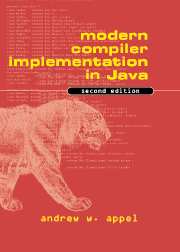Preface
Published online by Cambridge University Press: 05 June 2012
Summary
This book is intended as a textbook for a one- or two-semester course in compilers. Students will see the theory behind different components of a compiler, the programming techniques used to put the theory into practice, and the interfaces used to modularize the compiler. To make the interfaces and programming examples clear and concrete, we have written them in Java. Another edition of this book is available that uses the ML language.
Implementation project. The “student project compiler” that we have outlined is reasonably simple, but is organized to demonstrate some important techniques that are now in common use: abstract syntax trees to avoid tangling syntax and semantics, separation of instruction selection from register allocation, copy propagation to give flexibility to earlier phases of the compiler, and containment of target-machine dependencies. Unlike many “student compilers” found in other textbooks, this one has a simple but sophisticated back end, allowing good register allocation to be done after instruction selection.
This second edition of the book has a redesigned project compiler: It uses a subset of Java, called MiniJava, as the source language for the compiler project, it explains the use of the parser generators JavaCC and SableCC, and it promotes programming with the Visitor pattern. Students using this edition can implement a compiler for a language they're familiar with, using standard tools, in a more object-oriented style.
Information
- Type
- Chapter
- Information
- Modern Compiler Implementation in Java , pp. ix - xPublisher: Cambridge University PressPrint publication year: 2002
